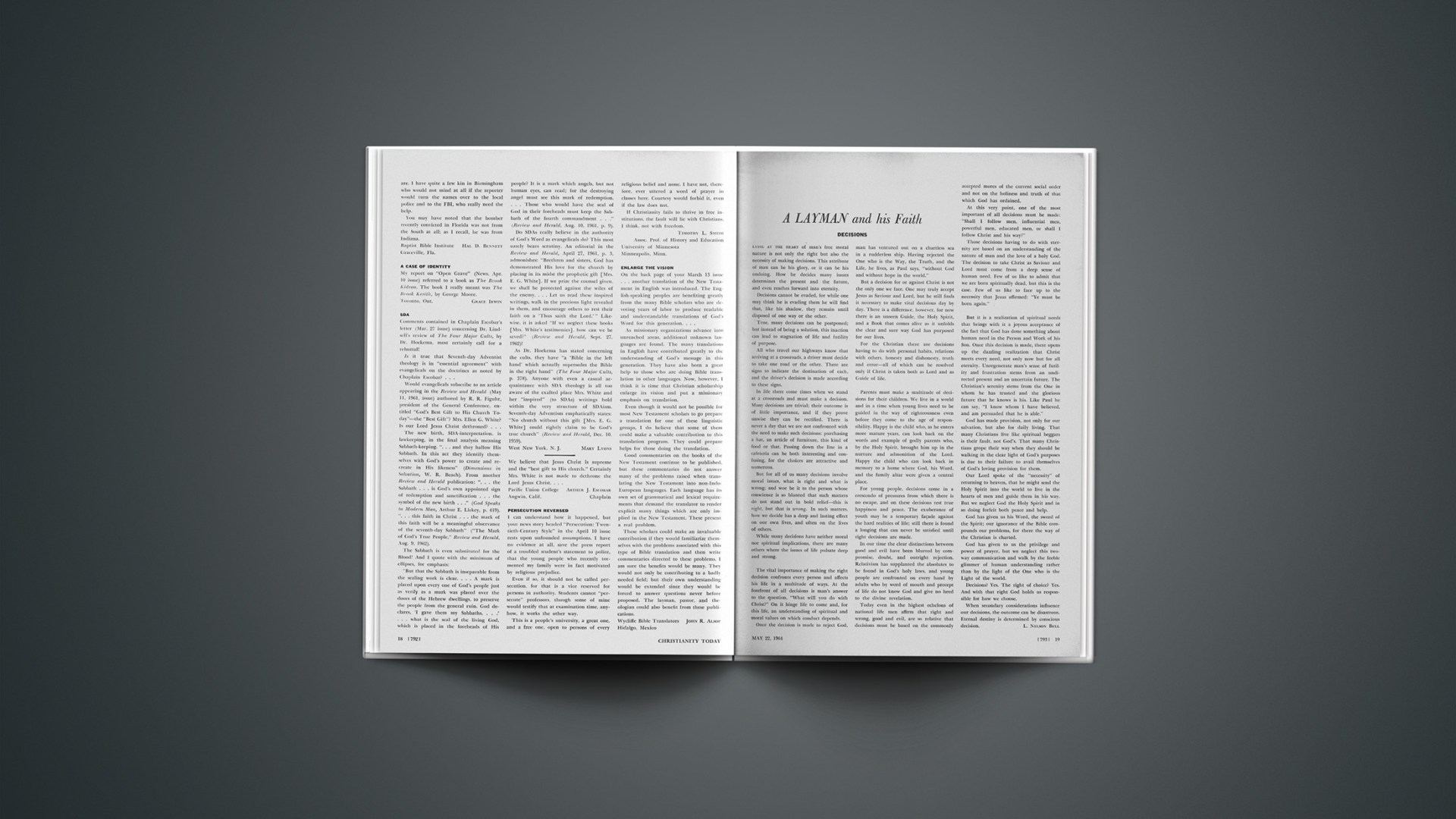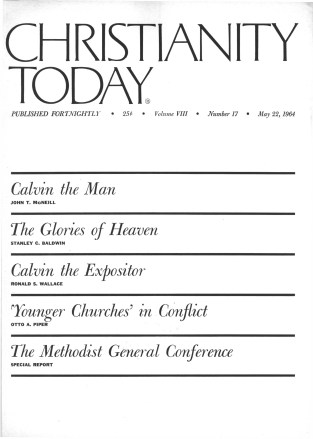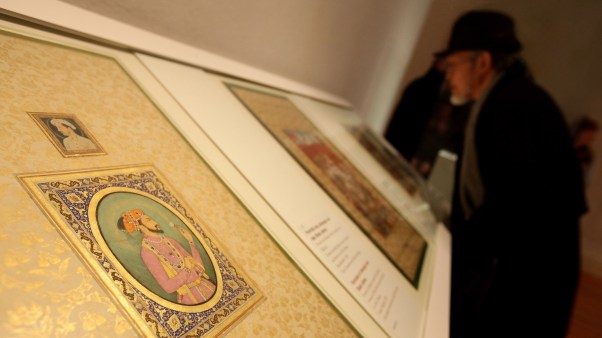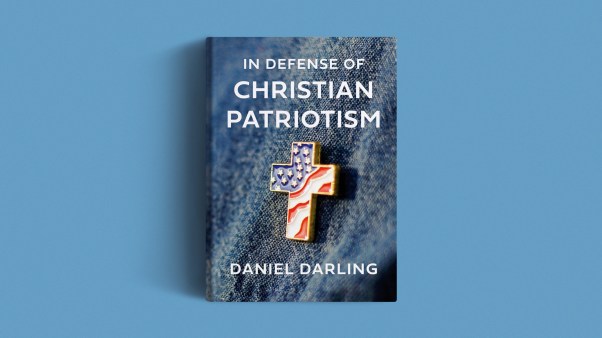Lying at the heart of man’s free moral nature is not only the right but also the necessity of making decisions. This attribute of man can be his glory, or it can be his undoing. How he decides many issues determines the present and the future, and even reaches forward into eternity.
Decisions cannot be evaded, for while one may think he is evading them he will find that, like his shadow, they remain until disposed of one way or the other.
True, many decisions can be postponed; but instead of being a solution, this inaction can lead to stagnation of life and futility of purpose.
All who travel our highways know that arriving at a crossroads, a driver must decide to take one road or the other. There are signs to indicate the destination of each, and the driver’s decision is made according to these signs.
In life there come times when we stand at a crossroads and must make a decision. Many decisions are trivial; their outcome is of little importance, and if they prove unwise they can be rectified. There is never a day that we are not confronted with the need to make such decisions: purchasing a hat, an article of furniture, this kind of food or that. Passing down the line in a cafeteria can be both interesting and confusing, for the choices are attractive and numerous.
But for all of us many decisions involve moral issues, what is right and what is wrong; and woe be it to the person whose conscience is so blunted that such matters do not stand out in bold relief—this is right, but that is wrong. In such matters, how we decide has a deep and lasting effect on our own lives, and often on the lives of others.
While many decisions have neither moral nor spiritual implications, there are many others where the issues of life pulsate deep anti strong.
The vital importance of making the right decision confronts every person and affects his life in a multitude of ways. At the forefront of all decisions is man’s answer to the question, “What will you do with Christ?” On it hinge life to come and, for this life, an understanding of spiritual and moral values on which conduct depends.
Once the decision is made to reject God, man has ventured out on a chartless sea in a rudderless ship. Having rejected the One who is the Way, the Truth, and the Life, he lives, as Paul says, “without God and without hope in the world.”
But a decision for or against Christ is not the only one we face. One may truly accept Jesus as Saviour and Lord, but he still finds it necessary to make vital decisions day by day. There is a difference, however, for now there is an unseen Guide, the Holy Spirit, and a Book that comes alive as it unfolds the clear and sure way God has purposed for our lives.
For the Christian there are decisions having to do with personal habits, relations with others, honesty and dishonesty, truth and error—all of which can be resolved only if Christ is taken both as Lord and as Guide of life.
Parents must make a multitude of decisions for their children. We live in a world and in a time when young lives need to be guided in the way of righteousness even before they come to the age of responsibility. Happy is the child who, as he enters more mature years, can look back on the words and example of godly parents who, by the Holy Spirit, brought him up in the nurture and admonition of the Lord. Happy the child who can look back in memory to a home where God, his Word, and the family altar were given a central place.
For young people, decisions come in a crescendo of pressures from which there is no escape, and on these decisions rest true happiness and peace. The exuberance of youth may be a temporary façade against the hard realities of life; still there is found a longing that can never be satisfied until right decisions are made.
In our time the clear distinctions between good and evil have been blurred by compromise, doubt, and outright rejection. Relativism has supplanted the absolutes to be found in God’s holy laws, and young people are confronted on every hand by adults who by word of mouth and precept of life do not know God and give no heed to the divine revelation.
Today even in the highest echelons of national life men affirm that right and wrong, good and evil, are so relative that decisions must be based on the commonly accepted mores of the current social order and not on the holiness and truth of that which God has ordained.
At this very point, one of the most important of all decisions must be made: “Shall I follow men, influential men, powerful men, educated men, or shall I follow Christ and his way?”
Those decisions having to do with eternity are based on an understanding of the nature of man and the love of a holy God. The decision to take Christ as Saviour and Lord must come from a deep sense of human need. Few of us like to admit that we are born spiritually dead, but this is the case. Few of us like to face up to the necessity that Jesus affirmed: “Ye must be born again.”
But it is a realization of spiritual needs that brings with it a joyous acceptance of the fact that God has done something about human need in the Person and Work of his Son. Once this decision is made, there opens up the dazzling realization that Christ meets every need, not only now but for all eternity. Unregenerate man’s sense of futility and frustration stems from an undirected present and an uncertain future. The Christian’s serenity stems from the One in whom he has trusted and the glorious future that he knows is his. Like Paul he can say, “I know whom I have believed, and am persuaded that he is able.”
God has made provision, not only for our salvation, but also for daily living. That many Christians live like spiritual beggars is their fault, not God’s. That many Christians grope their way when they should be walking in the clear light of God’s purposes is due to their failure to avail themselves of God’s loving provision for them.
Our Lord spoke of the “necessity” of returning to heaven, that he might send the Holy Spirit into the world to live in the hearts of men and guide them in his way. But we neglect God the Holy Spirit and in so doing forfeit both peace and help.
God has given us his Word, the sword of the Spirit; our ignorance of the Bible compounds our problems, for there the way of the Christian is charted.
God has given to us the privilege and power of prayer, but we neglect this two-way communication and walk by the feeble glimmer of human understanding rather than by the light of the One who is the Light of the world.
Decisions? Yes. The right of choice? Yes. And with that right God holds us responsible for how we choose.
When secondary considerations influence our decisions, the outcome can be disastrous. Eternal destiny is determined by conscious decision.










